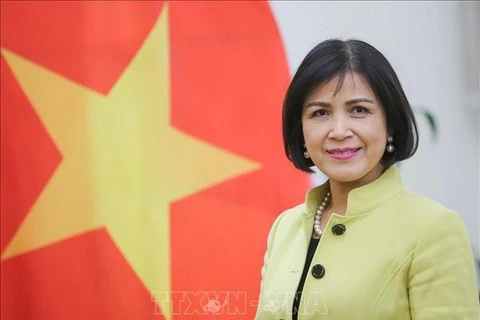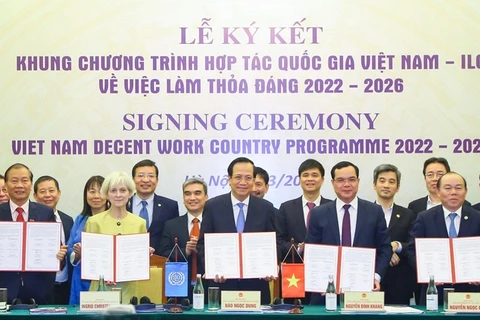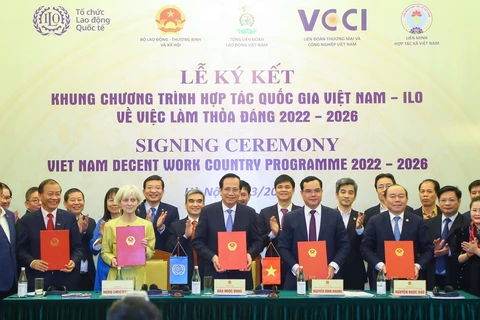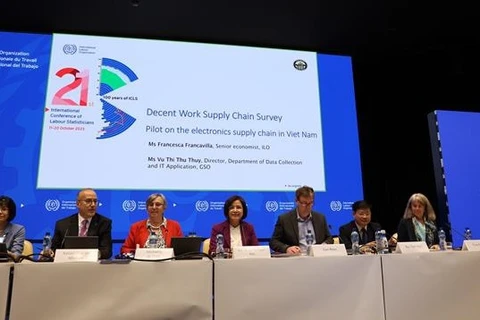 At the signing ceremony of the Vietnam Decent Work Country Programme for 2022 – 2026 in Hanoi on March 28, 2023. (Photo: VietnamPlus)
At the signing ceremony of the Vietnam Decent Work Country Programme for 2022 – 2026 in Hanoi on March 28, 2023. (Photo: VietnamPlus) Hanoi (VNA) – The Ministry of Labour, Invalids, and Social Affairs (MoLISA) held a workshop in Hanoi on October 28 to launch the Vietnam Decent Work Country Programme for 2022 – 2026.
The programme was signed between representatives of the Vietnamese Government, workers, and employers and the International Labour Organisation (ILO) in the capital city on March 28.
It provides a cooperation framework for the ILO and the Vietnamese partners until 2026 with a view to ensuring decent and sustainable work for all. By 2026, Vietnamese people will contribute and benefit equitably from the sustainable, inclusive, and gender-responsive economic transformation based on innovation, entrepreneurship, enhanced productivity, competitiveness, and decent work.
Another priority of the programme is that people will benefit from and contribute to a more just, safe and inclusive society. This is based on improved governance, more responsive institutions, strengthened rule of law and the protection of human rights, gender equality and freedom from all forms of violence and discrimination.
Since the Decent Work Agenda was launched globally by the ILO, Vietnam and the organisation have signed the Decent Work Country Programme for four cycles of 2006 - 2010, 2012 - 2016, 2017 – 2021, and 2022 - 2026.
Addressing the workshop, Director of MoLISA’s International Cooperation Department Luu Quang Tuan affirmed that during the past three phases, the ILO worked side by side with Vietnam (the Government, the workers' and employers' organisations) to effectively carry out this programme. The project helps to promote social equality and progress.
He said ILO’s technical support for Vietnam has been carried out through collaborative programmes and projects. They focus on providing technical assistance in the development of labour policies and laws and enhancing capacity building through training for tripartite partners at both the central and local levels. They also involve sharing information and documents to support research and training activities in various areas related to employment, social welfare, wages, labour relations, occupational safety, and skills development.
He affirmed that in the fourth phase, the Vietnamese Government will continue to focus on employment, human resources development, and social security in association with international economic integration. The plan is to ensure conformity with the sustainable development strategy, the balance between economic and social targets, as well as interests of workers, enterprises, and society.
ILO Country Director for Vietnam Ingrid Christensen said the programme has been jointly built by the ILO and Vietnam. She highlighted the need for harmonious connections between it and Vietnam’s national target programmes, contributing to the nation’s overall growth and realisation of the sustainable development goals./.
| Adopted in 1999, the ILO's Decent Work Agenda involves opportunities for work that is productive and delivers a fair income, security in the workplace and social protection for workers and their families. During the UN General Assembly in September 2015, decent work and the four pillars of the Decent Work Agenda – employment creation, social protection, rights at work, and social dialogue – became integral elements of the 2030 Agenda for Sustainable Development. |
























